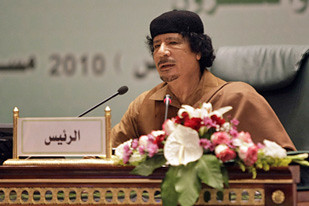
Libyan leader of the revolution Muammar Gaddafi hosting the 2010 Arab League Summit in Tripoli., a photo by Pan-African News Wire File Photos on Flickr.
Libya: Legacy Of The Uprising Two Years On
The Gaddafi regime may be gone but Human Rights Watch says the people of the town of Tawergha are still suffering serious abuses.
1:16pm UK, Wednesday 20 March 2013
HRW indentified 1,690 likely damage sites by analysis of satellite images
Tim Marshall
Foreign Affairs Editor
'Free Libya!' The chant has been heard again on this, the second anniversary of the beginning of the uprising which overthrew Colonel Gaddafi.
For hundreds of thousands of Libyans the chant rings hollow. For tens of thousands it is beyond a bad joke.
For the Tawerghans 'Free Libya' means people are free to persecute them for their alleged support of the Gaddafi regime and, because they are black.
Tawergha is a town about 30 miles from the city of Misratah. It is true that some people from the town did support the Gaddafi regime, indeed some fought for him and allegedly committed atrocities, but the entire population has suffered for that. It amounts to ethnic cleansing, collective punishment, and racism.
Today Human Rights Watch has released new satellite images showing the scale of systematic destruction of the town in the summer of 2011 after it fell to militia fighters who were backed by Nato firepower.
The militias burnt hundreds of buildings and murdered some of the residents. Most had fled fearing revenge for the siege of Misratah in which it is alleged some Tawerghan men had participated and during which committed atrocities. Those remaining in Tawergha were quickly forced to leave.
Eighteen months on up to 40,000 Tawerghan's are living in camps across Libya. According to their community leaders there are about 18,000 in Benghazi, 13,000 in Tripoli and 7,000 in Sebha with smaller numbers scattered elsewhere.
In Tripoli about 2,000 are holed up in an abandoned naval academy building. They are frightened to venture outside the perimeter of the camp because their dark skin makes them highly visible.
Those who do leave have to pass through checkpoints manned by militias all over the capital, many of them from the city of Misratah. They risk being humiliated, beaten, detained, and murdered.
Last year a Misratah gang entered the academy and murdered several men women and children.
Another dark-skinned group, the Mashasha, face similar problems.
Of the 8,000 people detained without trial or access to lawyers a disproportionate number are black, relative to the population.
The 'government' of Libya appears helpless to prevent the human rights abuses against black Libyans. The countries which intervened to ensure regime change in 2011 have been far less vocal about the current atrocities than they were about those committed by the Gaddafi regime.
Human Rights Watch said: "The double standard in addressing these crimes depending on who committed them erodes the credibility of governments that said they intervened to protect civilians."
This is the 'freedom' much heralded in October 2011 after the fall of Tripoli and the lynching of Gaddafi.
Media freedom is severely curtailed, and foreign journalists trying to report on the human rights abuses in the country are harried not only by suspicious militia men but also government authorities.
Those who called the militiamen 'freedom fighters' failed to understand that the local culture and tribal system means that for many of those fighters freedom meant the freedom to take revenge, and to persecute the weak. The Nato powers which engaged in regime change have turned a blind eye to the mess that is the new Libya.
The Arab countries which intervened are not known for their championing of individual rights or democracy, and the plight of black Libyans barely registers across the Middle East.
Libya is free of Gaddafi, but Libya is not free.
No comments:
Post a Comment